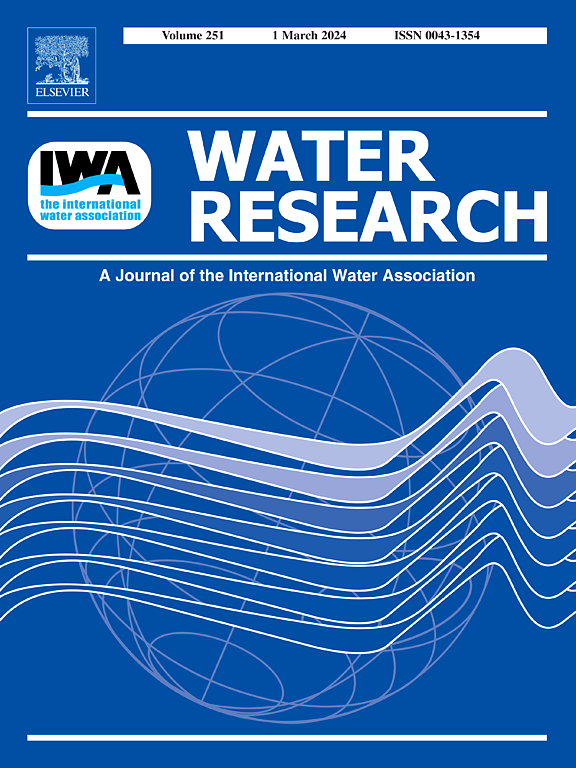Key process of ethanol hydrogen donor promoting the conversion of organic matter in sludge to bio-oil
IF 11.4
1区 环境科学与生态学
Q1 ENGINEERING, ENVIRONMENTAL
引用次数: 0
Abstract
To develop clean energy utilization of sewage sludge, this study investigated the conversion behavior of organics and energy in supercritical sludge-ethanol system. The influence of liquefied parameters on products distribution, hydrogen supply process of ethanol for sludge liquefaction, migration of organics, and energy transformation were investigated. Results indicated that ethanol acted as both a solvent and a hydrogen donor. It providing H⋅ to promote organics dissociation for bio-oil production through radical reactions. Formation of new products in bio-oil such as C20H38O2 and C20H38O2 may be caused by H⋅ generated from ![]() OH and
OH and ![]() CH in ethanol. The increase in dodecanes and hexadecanes in bio-oil may be formed by recombination of smaller radicals such as HO·, H·, CH3⋅, CH3CH2⋅ from dissociation of ethanol and organics. Additionally, energy migration process indicated that higher temperatures increased carbon content in bio-oil from 40.88 to 48.92 %, decreased oxygen content from 48.6 to 39.56 %, and raised the calorific value of bio-oil from 29.63 to 30.11 MJ/kg. Besides, approximately 74.14 % of sludge energy transferred to bio-oil, while about 71.94 % of oxygen moved to bio-char, reducing the calorific value of bio-char to 0.03 MJ/kg. Notably, about 240.5 kg of bio-oil can be produced from 1t of sludge, reducing net carbon emissions by 43.583 kg, and presenting a sustainable alternative to fossil fuels. This study innovatively investigated the dual role of ethanol for sludge liquefaction, providing an efficient and sustainable method for energy recovery from sludge.
CH in ethanol. The increase in dodecanes and hexadecanes in bio-oil may be formed by recombination of smaller radicals such as HO·, H·, CH3⋅, CH3CH2⋅ from dissociation of ethanol and organics. Additionally, energy migration process indicated that higher temperatures increased carbon content in bio-oil from 40.88 to 48.92 %, decreased oxygen content from 48.6 to 39.56 %, and raised the calorific value of bio-oil from 29.63 to 30.11 MJ/kg. Besides, approximately 74.14 % of sludge energy transferred to bio-oil, while about 71.94 % of oxygen moved to bio-char, reducing the calorific value of bio-char to 0.03 MJ/kg. Notably, about 240.5 kg of bio-oil can be produced from 1t of sludge, reducing net carbon emissions by 43.583 kg, and presenting a sustainable alternative to fossil fuels. This study innovatively investigated the dual role of ethanol for sludge liquefaction, providing an efficient and sustainable method for energy recovery from sludge.
乙醇供氢体促进污泥中有机物转化为生物油的关键过程
为开发污水污泥的清洁能源利用,本研究探讨了超临界污泥-乙醇系统中有机物和能量的转化行为。研究了液化参数对产物分布的影响、乙醇对污泥液化的供氢过程、有机物的迁移以及能量转化。结果表明,乙醇既是溶剂,又是氢供体。它通过自由基反应提供氢⋅以促进生物油生产中的有机物解离。生物油中新产物(如 C20H38O2 和 C20H38O2)的形成可能是由乙醇中的-OH 和-CH 产生的氢⋅引起的。生物油中十二烷和十六烷的增加可能是乙醇和有机物解离产生的较小自由基(如 HO-、H-、CH3⋅、CH3CH2⋅)重组形成的。此外,能量迁移过程表明,温度越高,生物油中的碳含量从 40.88% 增加到 48.92%,氧含量从 48.6% 降低到 39.56%,生物油的热值从 29.63 兆焦/千克提高到 30.11 兆焦/千克。此外,约 74.14% 的污泥能量转移到生物油中,约 71.94% 的氧气转移到生物炭中,生物炭的热值降低到 0.03 兆焦/千克。值得注意的是,1 吨污泥可生产约 240.5 千克生物油,净碳排放量减少 43.583 千克,是化石燃料的可持续替代品。这项研究创新性地探讨了乙醇在污泥液化中的双重作用,为从污泥中回收能源提供了一种高效、可持续的方法。
本文章由计算机程序翻译,如有差异,请以英文原文为准。
求助全文
约1分钟内获得全文
求助全文
来源期刊

Water Research
环境科学-工程:环境
CiteScore
20.80
自引率
9.40%
发文量
1307
审稿时长
38 days
期刊介绍:
Water Research, along with its open access companion journal Water Research X, serves as a platform for publishing original research papers covering various aspects of the science and technology related to the anthropogenic water cycle, water quality, and its management worldwide. The audience targeted by the journal comprises biologists, chemical engineers, chemists, civil engineers, environmental engineers, limnologists, and microbiologists. The scope of the journal include:
•Treatment processes for water and wastewaters (municipal, agricultural, industrial, and on-site treatment), including resource recovery and residuals management;
•Urban hydrology including sewer systems, stormwater management, and green infrastructure;
•Drinking water treatment and distribution;
•Potable and non-potable water reuse;
•Sanitation, public health, and risk assessment;
•Anaerobic digestion, solid and hazardous waste management, including source characterization and the effects and control of leachates and gaseous emissions;
•Contaminants (chemical, microbial, anthropogenic particles such as nanoparticles or microplastics) and related water quality sensing, monitoring, fate, and assessment;
•Anthropogenic impacts on inland, tidal, coastal and urban waters, focusing on surface and ground waters, and point and non-point sources of pollution;
•Environmental restoration, linked to surface water, groundwater and groundwater remediation;
•Analysis of the interfaces between sediments and water, and between water and atmosphere, focusing specifically on anthropogenic impacts;
•Mathematical modelling, systems analysis, machine learning, and beneficial use of big data related to the anthropogenic water cycle;
•Socio-economic, policy, and regulations studies.
 求助内容:
求助内容: 应助结果提醒方式:
应助结果提醒方式:


